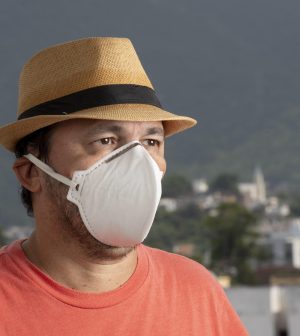- The Best Time of Day to Drink Bone Broth to Maximize Health Benefits
- 8 Ways to Increase Dopamine Naturally
- 7 Best Breads for Maintaining Stable Blood Sugar
- Gelatin vs. Collagen: Which is Best for Skin, Nails, and Joints?
- The Long-Term Effects of Daily Turmeric Supplements on Liver Health
- Could Your Grocery Store Meat Be Causing Recurring UTIs?
- Are You Making This Expensive Thermostat Error This Winter?
- Recognizing the Signs of Hypothyroidism
- 10 Strategies to Overcome Insomnia
- Could Artificial Sweeteners Be Aging the Brain Faster?
Many People With Asthma Have Mixed Feelings About Masks: Poll

Although they report difficulty breathing and discomfort while wearing a face mask, most people with asthma still use them in public places during the COVID-19 pandemic, a new study finds.
University of Illinois Chicago researchers conducted an online survey of more than 500 adults with asthma. They found that 84% reported discomfort and 75% reported trouble breathing or shortness of breath at least occasionally while wearing a face mask to guard against COVID-19.
Still, “the majority of those surveyed said about masks, ‘Just wear it,'” study co-author Dr. Sharmilee Nyenhuis said in a university news release. Nyenhuis is an associate professor in the College of Medicine.
Poorer asthma control and wearing a mask for longer periods of time were associated with more symptoms while wearing a mask, according to the study. The findings were published in the January issue of the Journal of Allergy and Clinical Immunology: In Practice.
As well as answering survey questions, participants were asked open-ended questions about their experiences wearing masks and their recommendations for other people with asthma.
In that part of the study, 45% of participants said they had problems breathing and increased coughing when wearing a mask; 39% said they had no change in their asthma when wearing a mask, and 2% said their asthma symptoms improved when wearing a mask, likely because the mask filtered out pollen and pollutants that trigger respiratory distress, according to the researchers.
About 5% of the participants said they don’t always wear a mask.
The study participants offered suggestions about mask-wearing for others with asthma. They included:
- Take the time to find a comfortable, well-fitting mask.
- Keep your inhaler with you.
- Stay on top of your asthma medications.
- Make sure your mask is at room temperature if cold triggers your asthma.
- Take mask breaks.
“Taking a mask break is important. It allows for opportunities to take large, deep breaths and do some breathing techniques,” said Nyenhuis, who suggested that employers consider making accommodations for those with asthma to take safe mask breaks.
There is no reason a person with asthma should not wear a mask, but those who have concerns about wearing a mask should talk with their doctor, Nyenhuis said.
More information
The U.S. Centers for Disease Control and Prevention has more on COVID-19 and asthma.
SOURCE: University of Illinois Chicago, news release, Jan. 20, 2022
Source: HealthDay
Copyright © 2026 HealthDay. All rights reserved.










